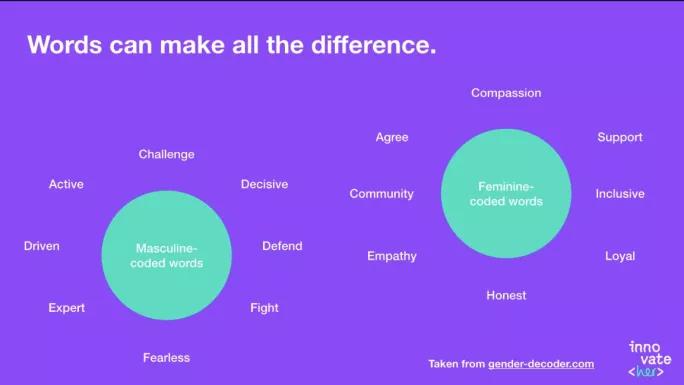- Home
- Gender stereotypes: is it all in the language?
Gender stereotypes: is it all in the language?

Only 17 per cent of tech roles in the UK are female, which is estimated to cost us £600 billion per year in lost GDP. Access to talent is cited as the most common challenge for 83 per cent of the UK’s tech clusters. Yet if we are only attracting half of the available gene pool to the sector, it will surely only exacerbate this issue. So where are all the women?
More on this: ‘I didn’t believe the apprenticeship stereotypes’
Background: Exclusive: FE gender pay gap far worse than the national average
Other news: Gender stereotyping in adverts is harming pupils, report says
Encouraging girls
Part of the problem is with the “leaky pipeline” as it is known. Just 20 per cent of computing science GCSEs nationally are achieved by young women, falling to 10 per cent at A level. This directly impacts on the uptake of post-16 pathways such as apprenticeships, T levels and A levels.
As a digital route panel member for the Institute for Apprenticeships and Technical Education, I firmly believe that we need to encourage more girls to pursue Stem subjects from an early age and make them aware of all of the available options, both academic and vocational. Lack of positive encouragement is part of the problem, coupled with a lack of visible role models. Lately, I have come to realise that it’s also about how we are promoting these opportunities and the language we use to describe them.
Diversity is hugely important because we create better technology when we have diverse teams creating it. For instance, when voice recognition software was first released, it didn’t recognise female voices because the team who created it were all male. With tech set to invade every part of our lives, it’s critical we have a diverse set of people programming these machines who will ultimately be making ethical decisions on our behalf.
Masculine-coded language
Research studies have shown that women felt that job adverts with masculine-coded language were less appealing and that they belonged less in those occupations. For men, feminine-coded adverts were only slightly less appealing and there was no effect on how much the men felt they belonged in those roles.
Steven Williams, tech talent acquisition partner at Shop Direct, led on the research and has provided some detail on the methods they applied and the results.
“The language we use when recruiting future talent - right from the earliest stages - plays a vital role in building a diverse and inclusive workforce. We have seen a 40 per cent uplift in female applicants for data and analytical roles, which have been historically mostly male.
One of our biggest struggles in 2018 was attracting top analytical talent into our teams. So, I went back to basics, reviewing our adverts and surrounding content. This led me to discover a range of research from across the US and the UK in regards to gender-neutral advertising. I tried varying online tools both free and paid for, and found that once you trial a few of these tools and read the research that sits behind it, then you can take a common-sense approach to this and run the detail via any online checker or gender decoder.
Based on our old advert, we were getting very little traction - with only 15 per cent candidate engagement. After we tailored the job advert to be gender neutral in language, the uplift was huge. We achieved a 147 per cent increase in overall applicants and a 40 per cent increase from the previous year on female applicants.
This is something I and Shop Direct are incredibly proud of and I’m so pleased my internal case study offered a proving ground to push the gender-neutral agenda forward! InnovateHer has been a driving force in this space for years, and it’s great that they’ve taken this model and created an industry standard at national level for all digital apprentices.”
Words can make all the difference
Some examples of masculine-coded words are “challenge”, “decisive”, “expert” and “driven” whereas some examples of feminine-coded words are “compassion”, “support”, “inclusive” and “honest”.
We are certainly not suggesting that women can’t be “leaders” or can’t be “driven” or “decisive” or any of other masculine coded words. Women can be - and often are - all of those things. I personally would say that I identify with those traits, as a leader of a small business. What we are saying is that the data from Shop Direct’s recent study shows that when you change the language you use, you can change the outcome hugely, based on the fact that women often don’t perceive themselves as having these masculine traits. Which is an unfortunate consequence of the patriarchy in which we all live.

Putting it into practice
It’s therefore really important for the language we use in the apprenticeship content to be gender neutral, as it can potentially change the outcome. We’ve found some online tools which work for checking this and we will be trialling the methodology on the digital standards going forward, alongside developing a best practice guide for awarding organisations and Institutions to help guide them in advertising apprenticeships too.
This works both ways, for instance, when designing a qualification for nursing which doesn’t deter males and when designing a qualification for digital which doesn’t deter females. The shared vision is that all apprenticeships content should eventually run through a language check if we can prove a positive outcome within the digital pathways.
As industry panel members, we are all responsible for designing and creating apprenticeship standards which we hope will attract a wide range of people from diverse backgrounds. I believe that through apprenticeships we can improve social mobility, providing options for those who either can’t afford University or aren’t excited by that path. The language we choose to use is crucial. My hope is that we can make a difference by changing the narrative.
Jo Morfee is co-founder at InnovateHer
Keep reading for just £1 per month
You've reached your limit of free articles this month. Subscribe for £1 per month for three months and get:
- Unlimited access to all Tes magazine content
- Exclusive subscriber-only stories
- Award-winning email newsletters